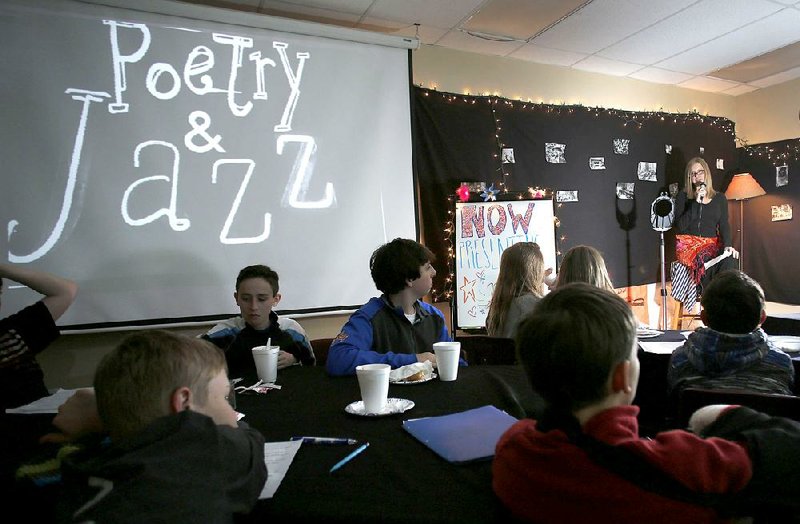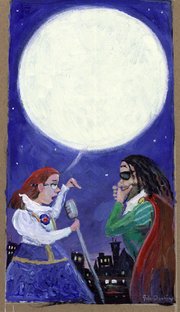The Southern Fried Poetry Festival comes to the stage Tuesday through Saturday in Little Rock.
The 23-year-old festival is billed as the Southeast's largest poetry event, and a first for Little Rock. The five-day lineup of free performances, workshops and other poetry-related events lead to Saturday's slam finals.
The Southern Fried Poetry Festival
Tuesday-Saturday, various venues including the Arkansas Arts Center, Historic Arkansas Museum, Arkansas Studies Institute, Little Rock Main Library, South on Main and Mosaic Templars Cultural Center
Activities include a haiku slam, noon Friday at the Arkansas Arts Center, and performances 7-11 a.m. Saturday at Argenta Farmers Market, North Little Rock
Indie finals: 3-6 p.m. Saturday, Arkansas Arts Center Children’s Theatre
Team finals: 7-11 p.m. Saturday, Statehouse Convention Center
Admission: most events are free; admission to the two finals is $15 in advance, $25 at the door
More information and complete schedule: sofried2015.com; call Louise Palermo at the Arkansas Arts Center, (501) 372-4000
• Ekphrastic Slam at 6:30 p.m. Tuesday, $5 arts center members, $10 nonmembers. Info: arkarts.com, (501) 372-4000
• Information about Poets Roundtable of Arkansas: poetsroundtable.web…
"It's a festival for poets of all kinds, from spoken word to what we consider literary," slam-master Amoja "The Mo-Man" Sumler says.
Forty teams and 20 independent poets will compete for audience approval, coming from as far away as Los Angeles; Austin, Texas; Richmond, Va.; and Knoxville, Tenn.; as well as Arkansas poets from Hot Springs and Sherwood.
Little Rock team Rocktown Slam is host of the event, to be held at several venues including the Arkansas Arts Center. The Arts Center is home to the festival-related, fifth-year event, Art on Art: An Ekphrastic Slam, on Tuesday.
The Southern Fried festival showcases a range of poetry, from haiku to poetry about women's and gay issues, but excitement centers on the art of slam.
Part coffeehouse reading, part stand-up performance, part rowdy competition, slam is a contest played by the rules for applause and judges' scoring.
The Arts Center's Ekphrastic Slam is "art inspired by art," director of education programs Louise Palermo says. In the spirit of the John Keats poem "Ode on a Grecian Urn," this year's event challenges contestants to find poetry in the current exhibit by black artists, "30 Americans."
Poetry fits the Arts Center's mission of celebrating all sorts of art, Palermo says.
"It makes your heart grow," she says. "It makes us better people."
Slam is not quiet poetry, the way people might remember reading Robert Frost or Emily Dickinson in school. ("Saying nothing," Dickinson wrote,
"sometimes says the most.")
But the form is misunderstood if it seems spontaneous, Palermo says.
"These poets write and rewrite and edit and strike out," she says. Besides, "they're very practiced, so the performance is just right."
SLAM-BANG
Arkansas has had poetry slams for years.
Rocktown Slam claims to be the "the oldest, continuously running slam in central Arkansas," started at Vino's brewpub in 1991. Poets do slams and readings in Hot Springs, Fayetteville and Eureka Springs clubs and in schools all around the state.
The Southern Fried Poetry Festival expands the idea to a citywide roster of activities, officially welcomed by Little Rock Mayor Mark Stodola as "the best of a diverse, cultural means of expression."
"This is only the third time it's been on this side of the Mississippi [River]," Sumler says. The last three years' festivals were in Tampa, Fla., New Orleans and Greenville, S.C., and next year's event will be in Greensboro, N.C. The festival reports combined attendance of more than 50,000 over the years.
Sumler expects Little Rock's festival will be "the biggest thus far." He pitched Little Rock to the festival's decision makers based on the city's friendliness and attractions.
"I had already obtained a letter from Mayor Stodola," he says, "and the steadfast support of the Arkansas Arts Center. The rest was showcasing the beauty of central Arkansas," including the prospect of Saturday's picnic at noon in MacArthur Park.
Poetry slams go back to Chicago 30 years ago. The Southern Fried Poetry Festival started in Asheville, N.C., as a way to make poetry more a part of people's lives.
Public performance is a contest of preliminary rounds, from which the winners advance to local, state, regional and national titles.
At the same time, the festival's mission statement calls for poets to pitch in and volunteer their services wherever they find themselves -- to "soup kitchens, youth programs and Habitat for Humanity."
The slam-master is a combination host and master of ceremonies, Sumler's role with the 10- to 15-member Rocktown Slam prior to his move from Arkansas to Washington.
The University of Arkansas at Little Rock graduate cites 15 years' experience with poetry, technical writing and education.
"I have dedicated myself to serious study of both written poetry and spoken word tradition," Sumler says. The subject encompasses "the three basic concepts of knowledge, action and voice."
Palermo credits Sumler with years of effort to bring the Southern Fried festival to Little Rock, meeting such requirements as establishing a core group of poetry enthusiasts -- a poetry community.
Besides, she says, he does the nearly impossible:
"He's a professional poet," she says. "That's what he does for a living."
...
"Translucent Mahogany"
My mahogany
is rich as the
chocolate
I ingest.
Skin aglow
to my eyes.
Georgetown leaves me
a walking
magic trick.
when shopping:
I'm see through
faded.
Transfixingly translucent.
The shop owner
does not see color.
-- Amoja "The Mo-Man" Sumler
WELL VERSED
Arkansas has a history of poetry, from the rustic lyrics of "The Arkansas Traveler" to state poet laureate Peggy Caudle Vining and her predecessors -- Charles T. Davis, Rosa Zagnoni Marinoni, Ercil Brown, Lily Peter and Verna Lee Hinegardner.
Traditional poetry finds a home among members of the state's 84-year-old poetry society, the Poets' Roundtable of Arkansas.
"Poetry slams and the art of written poetry are two totally different things," says Laura Loughridge, president of the society's Little Rock branch, the River Market Poets. Some of the group's members do readings, but the emphasis is on "how the poem looks on paper, the beauty of it and its unique words."
For poetry lovers who have not attended a slam before, she cautions that slam can be the roughhouse of poetry. Slams deal in activism, strong emotions and sometimes "questionable language."
For those who want to know more about slam, she recommends Sumler. "Amoja is a highly intelligent man," Loughridge says. "I can't say enough good things about him."
Little Rock poet and Bryant schoolteacher Caroline Walton ventured on stage at a Rocktown Slam. "I didn't know anybody," she says, and so felt she had nothing to lose. The experience taught her a new means of expression.
Walton will be master of ceremonies for the Southern Fried festival's showcase, "Phenomenal Women," at 2:30 p.m. Thursday at Rock Town Distillery.
"It's important," she says. "A lot of times, women's voices are the ones that are drowned out."
In slam, "the idea is that a good poem is a good poem," Walton says. "If it's a good poem, it will sound well on stage."
But slammers learn that it's one thing to write a poem, she says, and something else to say it in front of an opinionated audience.
Her piece, "How to Write a Happy Poem," acknowledges that slam poetry often deals with uncomfortable subjects, and tells how to avoid upsetting anybody:
...
Before you sit down to write, open all of the windows.
Summon butterflies and birds and fuzzy forest creatures
like freaking Snow White. Have them dance around you and sing
while rays of sunshine and rainbows erupt from your pen ...
You wouldn't want to stumble on anything unsightly.
You wouldn't want to shine your headlights on truth.
-- Excerpted from "How to Write a Happy Poem" by Caroline Walton
TRUTH AND CONSEQUENCES
The Southern Fried festival has events dedicated to guerrilla poetry, erotic poetry, even nerd poetry. But slam did not invent the outlaw poet.
The classic English poet Lord Byron was notorious in the 18th century, as one of his lovers described him, as "mad, bad and dangerous to know."
Other times, slam poets do as poets always have, seeking insight from common experience:
...
My stomach drops
after takeoff.
On the ascent,
it's never more apparent
you have to fall before
you can fly.
-- Excerpted from "Cities in Flight" by Kim Marshall
...
Among out-of-state slam poets who cite Arkansas and the Mo-Man as influences, Washington poet Kim Marshall started from one of the first slams organized in Little Rock.
Before, "poetry was kind of my secret outlet," she says, not something she expected to share. After, she has become a slam regular.
Growing up in Arkansas and other places in a military family, she finds in the Southern Fried festival a feeling of home "you don't necessarily get at other conventions."
"There's hugging," she says. "Some people come from really far away. There's a sense of family reunion, sharing stories, even though there's a sense of competition about it."
Having attended and performed at several previous Southern Fried events, she describes the scene:
"Slam allows the audience to get involved," Marshall says. "It allows the audience to cheer and boo. It's not like,'Here's the important poet, so you have to be quiet and listen.'"
But as the important poet Carl Sandburg once said: "Poetry is the synthesis of hyacinths and biscuits."
Style on 05/31/2015


